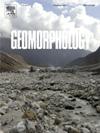Response of estuarine morphology to storm surge barriers, closure dams and sea level rise
IF 3.1
2区 地球科学
Q2 GEOGRAPHY, PHYSICAL
引用次数: 0
Abstract
Storm surge barriers and closure dams influence estuarine morphology. Minimizing consequential ecological impacts requires a thorough understanding of the morphological adaptation mechanisms and associated time scales. Both are unraveled using three decades of morphological measurements on the adaptation of the Eastern Scheldt estuary (The Netherlands) to a storm surge barrier and closure dams. Both the storm surge barrier (through a decrease in cross-sectional area) and closure dams (inducing a reduction in surface area of the estuary) contributed to a reduction in tidal prism. As a smaller tidal prism implies a smaller equilibrium volume of the channels, the channels demand sediment to adjust. Consequently, by providing sediment to the channels, the intertidal flats erode. Erosion rates decreased while the sediment demand of the channels attenuated. This attenuation in sediment demand resulted mainly from tidal prism gains, caused by intertidal flat erosion and sea level rise. Erosion rates of the intertidal flats decreased further while they flattened to adapt to the reduced tidal velocities. Furthermore, storms caused erosion events, after which the long-term adaptation pace of intertidal flats suddenly reduced. Despite decreasing erosion, sea level rise enhances the drowning of intertidal flats in sediment-scarce estuarine systems, thereby pressuring these estuarine ecosystems and raising the need for mitigation measures.
河口形态对风暴潮屏障、封坝和海平面上升的响应
风暴潮屏障和封坝会影响河口形态。要最大限度地减少对生态的影响,就必须全面了解形态适应机制和相关的时间尺度。我们利用三十年来对东斯海尔德河口(荷兰)适应风暴潮屏障和封坝的形态测量结果,揭示了这两种机制。风暴潮屏障(通过减少横截面积)和封坝(导致河口表面积减少)都有助于减少潮汐棱镜。由于较小的潮汐棱镜意味着河道的平衡容积较小,河道需要沉积物来调整。因此,通过向河道提供沉积物,潮间带滩地受到侵蚀。侵蚀率降低的同时,水道对沉积物的需求也在减少。泥沙需求量的减少主要是由于潮间带侵蚀和海平面上升导致潮汐棱镜增加。潮间带滩涂的侵蚀率进一步降低,同时潮间带滩涂变平,以适应降低的潮汐流速。此外,风暴造成的侵蚀事件之后,潮间带滩涂的长期适应速度突然降低。尽管侵蚀速度下降,但海平面上升加剧了沉积物稀少的河口系统中潮间带滩地的淹没,从而对这些河口生态系统造成压力,并提高了采取缓解措施的必要性。
本文章由计算机程序翻译,如有差异,请以英文原文为准。
求助全文
约1分钟内获得全文
求助全文
来源期刊

Geomorphology
地学-地球科学综合
CiteScore
8.00
自引率
10.30%
发文量
309
审稿时长
3.4 months
期刊介绍:
Our journal''s scope includes geomorphic themes of: tectonics and regional structure; glacial processes and landforms; fluvial sequences, Quaternary environmental change and dating; fluvial processes and landforms; mass movement, slopes and periglacial processes; hillslopes and soil erosion; weathering, karst and soils; aeolian processes and landforms, coastal dunes and arid environments; coastal and marine processes, estuaries and lakes; modelling, theoretical and quantitative geomorphology; DEM, GIS and remote sensing methods and applications; hazards, applied and planetary geomorphology; and volcanics.
 求助内容:
求助内容: 应助结果提醒方式:
应助结果提醒方式:


